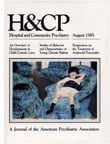Paradoxes Faced by Residents Being Trained in the Psychosocial Treatment of People With Chronic Schizophrenia
Abstract
The authors describe seven paradoxes that confront psychiatric residents being trained in the psychosocial treatment of chronic schizopbrenic patients in community settings. The paradoxes arise because the psychosocial framework necessary for working with such patients challenges the residents' strongly held beliefs and values concerning the nature of psychotherapy and of schizophrenia. The paradoxes result in stress and resistance to learning new approaches and must be clarified and resolved for training to proceed successfully. The authors examine the origins of the paradoxes and the reactions of residents to each, and describe how the supervisory relationships of the training setting can be used to resolve them.
Access content
To read the fulltext, please use one of the options below to sign in or purchase access.- Personal login
- Institutional Login
- Sign in via OpenAthens
- Register for access
-
Please login/register if you wish to pair your device and check access availability.
Not a subscriber?
PsychiatryOnline subscription options offer access to the DSM-5 library, books, journals, CME, and patient resources. This all-in-one virtual library provides psychiatrists and mental health professionals with key resources for diagnosis, treatment, research, and professional development.
Need more help? PsychiatryOnline Customer Service may be reached by emailing [email protected] or by calling 800-368-5777 (in the U.S.) or 703-907-7322 (outside the U.S.).



